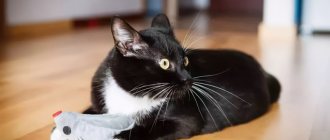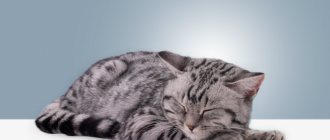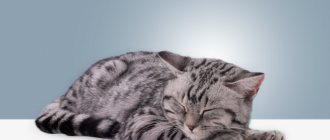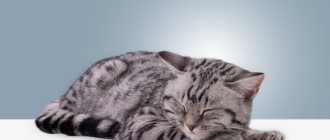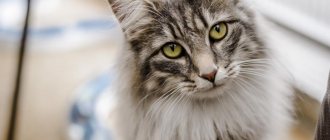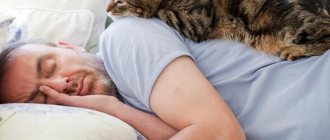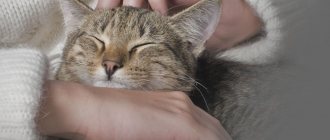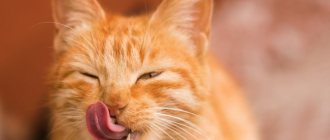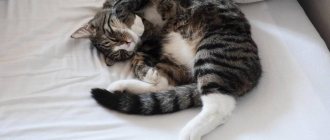Why do adult cats chew?
Most cats stop needing to chew as they get older and have molars. If an adult cat suddenly starts chewing things for no apparent reason, this is the first sign of boredom. Your pet should have a place in the house where he can jump, climb, climb, and sharpen his claws on his own without fear of punishment. It is necessary to provide him with a large number of toys, among which new ones should appear regularly. You can hide and rearrange your favorite toys: you need to make the cat move and climb somewhere in the house to find them - this will help him avoid boredom.
To distract your pet further, buy special plants or herbs from the pet store and place them near wires and furniture that he likes to chew and gnaw. These plants will give your cat much more pleasure than a piece of plastic or fabric, and will distract attention from things not intended for this purpose.
How to stop a cat from chewing everything
1) The cat chews things
2) The reason is nutritional imbalance
3) The reason is the need to remove hair from the body
4) Reason – lack of activity
5) How can you stop a cat from gnawing?
The cat chews things
Sometimes people who keep cats come home and find various chewed objects. It's good if they're just toys. It’s worse if the cat chooses to gnaw on something more valuable to the owner - flowers, for example (which is not uncommon), or clothes. The worst thing is if wires become the object of your pet's teeth.
Firstly, if the wires are live, then the pet itself risks its health and even life. Secondly, due to a chewed wire, a short circuit can occur, in some cases this can even lead to a fire. And thirdly, because of this, quite expensive things (computer, TV, refrigerator, etc.) can fail. That is why it is so important to understand in time how to stop a kitten from chewing wires.
First, you need to understand for what purpose a cat chews this or that. There can be many specific reasons, but they all somehow come down to two global ones: the kitten has nothing to do and is looking for entertainment, or the pet is gnawing on something to get the necessary substances. In other words, it is either a medical problem (or simply a necessity) or a behavioral one. At the Murkosha shelter, we have been faced with both options more than once, so we have developed several rules that help wean a cat from gnawing wires or other things.
The reason is nutritional imbalance
The best place to start is with the assumption that the cat is chewing something because it is missing something. Especially if she gnaws or eats flowers. In this case, her behavior does not look too strange. In the wild, predators, which include cats, eat food not only of animal origin, but also of plant origin. Coarse plant fibers aid digestion and contain many vitamins. Thus, your pet is simply lacking some of the vitamins and minerals found in greens. And gnawing flowers, the kitten tries to replenish them. Essentially, this is a signal to you that his diet is unbalanced.
Most often, this problem occurs if you feed your cat food from your table. Human food is not very healthy for a cat, since she and we still have different metabolisms. Cheap foods like Whiskas and Kitiket are even more harmful. They are completely devoid of useful minerals and vitamins (they also lack meat, it is replaced with bone meal and waste from the meat industry). It is not surprising that the cat is trying to replenish the missing but necessary substances. In this case, not only flowers can be used (there is a logic here), but even inedible items, especially those made of wool, cotton and synthetic materials. Wires may also be damaged.
Therefore, the first step to take if you see your cat chewing on flowers or wires is to take her to the vet. Only a doctor can tell whether your pet’s health is okay and also give the necessary recommendations. After this, you will need to change your pet's diet.
The Murkoshi team, based on many years of experience working with cats and research into the composition of food, recommends feeding pets exclusively with super-premium or holistic-class food. Because only such food is completely balanced, as close as possible to the natural diet of cats in the wild, and enriched with all necessary vitamins and minerals. In this case, there will not even be a need to give your pet any additional vitamins. If the reason for the pet’s painful attention to flowers or inedible objects was precisely the lack of some substances, then after switching to high-quality food there is a chance that it will be possible to wean the cat from gnawing them, even without resorting to any other methods.
Read more about proper nutrition for cats: https://www.murkosha.ru/nashi-stati/soderzhanie-i-ukhod/kakim-kormom-kormit-koshku
The reason is the need to remove hair from the body
In the case of flowers, there is another equally common reason why a kitten chews them - in this way he is trying to get rid of fur in the stomach, which he often swallows when licking. In the wild, cats cope with excess ingested hair in this way - by eating certain herbs. This is truly vital for a cat, and greens help your pet with such an important task. If he has nothing more suitable, he will solve the problem with the help of indoor plants. Moreover, this need does not depend on the quality of the feed.
Fortunately, in this case it is quite simple to wean a kitten from gnawing flowers. You need to buy a special mixture for planting grass, which sprouts very quickly. You can buy this at almost any pet store. All cats eat such green shoots with pleasure. And they will help better than indoor plants in getting rid of fur in the stomach.
First, the pot or container with this special herb must be placed in the place where the most gnawed flower is located. Very quickly the pet will realize that the new grass is much better than the old one and will get used to it. Then you can move it away from indoor plants. Over time, the predator will have a path only to his personal lawn. Keep in mind that this weed should always be available to your pet.
Read more about why a cat eats flowers: Cat chews flowers: how to solve the problem
Reason: lack of activity
Well, sometimes kittens nibble on flowers simply because they are bored. They don't get played with enough, so they have to spend extra energy exploring the nooks and crannies of your apartment and playing with everything they can interact with. In this case, not only flowers usually suffer, but also other things, including furniture and wallpaper. But most of all, bored cats are attracted to wires!
It's no secret that cats, and especially kittens, love to play. And perhaps most of all they love various ropes, threads, ribbons, etc. Perhaps you have ever seen how excitedly a cat can untangle a tangle. And even past one lying in a visible place or - even more so! – not a single kitten will pass a hanging and dangling wire.
This behavior will be all the more pronounced the less people in the house devote time to the kitten and, accordingly, the more it is left to its own devices. The logic here is simple: a kitten’s energy is a more or less constant quantity, it needs to be put somewhere, either it is spent during play, or the kitten is looking for something to do, exploring different corners of your apartment. And we already said how hanging wires might interest him.
When he grows up, the habit of hunting for wires remains and is reinforced. In addition, although adult pets become calmer, they also need to do something and spend their extra energy somewhere.
Read more about “hunting” wires: Why does a cat chew wires and what to do about it
Therefore, in order to wean a kitten from gnawing wires (as well as flowers and other things), you need to start playing with it. This is a mandatory condition; all other methods of weaning are unlikely to give a long-term effect if the kitten does not find somewhere to throw out excess energy.
With an adult pet, as a rule, it is enough to play 2-3 times a day for about 15 minutes. This will provide the necessary level of physical activity and will tire him out in a good way, so that he will have no desire to play with your things and spoil them. The kitten needs to be given more time. The basic rule: play until he gets tired, that is, he lies down and stops paying attention to the toys. And such “game sessions” may require up to 5-6 per day. But don’t be alarmed ahead of time: if the game is exciting and active, not a single kitten will require you to play for an hour straight or more (we understand that this will be difficult for the person himself), as a rule, after 15-20 minutes of active play he will get tired .
Read more about games: Why do cats play and how to do it correctly with them?
How can you stop a cat from chewing?
In addition, volunteers at the Murkosha shelter know several secrets that will help stop a cat from chewing things.
- Smell
Cats hate the smell of citrus fruits, aloe, and vinegar. Treat the wires, for example, with lemon or aloe juice (Anti-gryzin spray, sold in pet stores, is also excellent). Indoor plants can be sprayed with orange or lemon water (just squeeze the citrus into the water) or put a slice of lemon directly into the pot. A hated citrus smell, sour or bitter taste will make the cat think next time whether it’s worth chewing on.
- Special repellers
You can also buy special devices in pet stores that supply air flow when a cat approaches them (thereby they can protect a plant or a section of wire). This will scare the cat away without causing any harm to it. The bonus is that your pet will not attribute the unpleasant effect to you.
- Protective means
As a last resort, you can resort to mechanical means of protection. It makes sense to put corrugated plastic tubes on the wires. This way your pet won't be able to bite through them. Flowers can be covered using a fine-mesh mesh and a good frame, which will make it possible to lower the mesh during watering and spraying.
Thus, your pet may chew on flowers or other things either because there is something missing in its diet or because it is bored. Accordingly, in order to wean a cat from gnawing, you must first show it to the veterinarian, and then start playing with it 2-3 times a day. In addition, an object suffering from cat teeth can be treated with a citrus scent, protected with special means (plastic, mesh) or repellers that supply an air stream.
“Murkosha” reminds you: no problems, even such serious ones as with wires, can compare with the positive emotions that a pet can give you. Moreover, any difficulties have a solution! So, if you already have a cat, do not under any circumstances get rid of it, even if it has done something wrong. Love, care, active games, and, if necessary, veterinary care can fix everything. And if you don’t have a pet yet, then it’s time to choose one and get one - for example, by adopting one from our shelter!
How to protect furniture and wallpaper from a cat
Give your animal something that can scratch without damaging your budget and nervous system - a scratching post. They are made of wood or durable cardboard and covered with coarse fiber or other material.
Scratching posts can be either stand-alone or included as part of a multi-level space where the animal can sleep, play and scratch.
To make the right choice and protect furniture from the effects of cat claws, study at what height the animal most often scratches. Look at what surface he prefers: wood, walls, sofa...
The cat chews everything
What makes a kitten or an adult animal chew inedible objects? The main reason is the imitation of the behavior of an adult; perhaps in the house where the baby grew up there was a cat with such a predilection. In this case, the behavior is quite easy to correct. The second common reason why a cat chews everything is changing teeth and gum problems. In the first case, the habit arises suddenly and also suddenly disappears, along with the need to scratch the gums. The second case requires a visit to the veterinarian, who will help identify the problem and its causes. Most likely, the issue will be resolved by changing the diet or switching to another type of food. The third reason is psychological. So a cat can demand attention, take revenge for undeserved punishment, or signal bad health. In this case, you need to be patient and take a closer look at the animal; if there are no obvious signs of illness, then you can begin to adjust the behavior.
The cat chews everything
Cats chew on things from time to time as part of normal cat behavior. They do this for various reasons, for example, while playing with their toys. However, sometimes a cat will begin to chew furniture, carpets and other household items, as well as chew its skin in places where it is irritated. They may compulsively lick other cats, scratch them, and even try to chew their fur.
Wires and cords
Cats tend to find cords and wires to chew on, especially if left alone during the day. Try to provide your cat or kitten with plenty of toys to play with alone, including wall or door toys for them to hit, cat towers to explore with toys attached for added interest, or even arranging cardboard boxes on the floor to form a tunnel. with holes cut on the sides. Treat toys are a great way to satisfy their hunting instincts.
To deal with wire situations, you need to come up with a way to cover the wires, block access to them, or make them unpleasant to chew.
What to put on the wires to wean them off
Any bitter taste is unpleasant for the cat. You can lubricate the surface of the wires:
- fresh orange peel (outer part);
- the middle of an aloe leaf;
- a clove of garlic or onion;
- soap solution with pepper - the animal will not like the bitter taste.
Disadvantage of methods (with the exception of soap): the unpleasant odor quickly disappears, and bitterness ceases to be so when interacting with oxygen. The electrical cord will have to be processed several times.
How to curb your chewing habit
If your adult cat continues to chew things even though you've given him plenty of other options, other measures need to be taken to curb the behavior. Spraying odorous substances in areas where the cat chews and gnaws is extremely effective. There are several smells that cats do not like, but which will not cause discomfort to the rest of the family.
These odors include:
- Strong (bitter) apple smell: spray can be found at a pet store
- Chili pepper (Cayenne pepper): mix pepper with water
- Orange oil: Mix one part orange oil and three parts water.
- Mint
- Rosemary.
We should also not forget that the constant need to chew can be caused by a medical problem - this is the first sign of obsessive-compulsive disorder (OCD), an obsessive disorder.
In some cases, cats with this neurosis (OCD) experience an obsessive state - in this case it manifests itself in incessant chewing. Most cases of OCD in cats require drug intervention to calm the symptoms and eliminate the unwanted behavior. Only a veterinarian can determine whether an animal truly has OCD! So instead of trying to treat your pet yourself with herbs or home remedies, schedule an examination with your doctor to determine the correct diagnosis.
What to do if your cat is constantly gnawing on something.
If your cat begins to chew on inedible objects, take her to the vet. This is a common deviation in behavior; the doctor will give recommendations on how to correct it. In addition, the doctor will conduct a full examination to identify possible diseases. This is important to do, because if the cause is a disease, it will need to be treated. There may be dental problems in which trying to chew on something, such as plastic objects or chair arms, makes the animal feel better. Gastrointestinal diseases and stomach disorders are possible, in which the cat feels that it needs to chew on something such as wool or carpet.
The veterinarian will conduct laboratory tests - biochemistry, urine and blood tests. Additional tests may be performed to detect deficiencies in certain nutrients.
The doctor will be helped by information about when the cat started chewing everything and about other behavioral changes, such as overgrooming (excessive licking) and attempts to lick other cats. It is important whether she gnaws everything indiscriminately or only specific materials - wool, braid, furniture upholstery, carpets, etc.
Treatment depends on the diagnosis. If a disease is found, the veterinarian will prescribe medications and explain how to use them. If it is a behavioral problem, he will tell you how to fix it.
We are solving a simple problem
The easiest way to avoid spoiled items is to isolate them. Hide the wires in special covers or under the baseboard, do not decorate the Christmas tree with “rain”, hide small items after using them.
If this is not possible, treat their surface with vinegar, lemon juice or a special spray that can be purchased at a pet store. A sharp, unpleasant smell for a cat will quickly wean it from the habit of encroaching on these objects.
Switch your pet's attention to toys.
Different, ringing and rustling, stationary and mobile, so that the cat does not feel the need to eat other objects. If your pet has a weakness for indoor plants, organize him a personal greenhouse. Sprout wheat and oats in plastic cups and keep them within easy reach.
And try to strictly suppress all attempts to attack unauthorized items.
Spray next to the cat with a spray bottle, trying not to get into the eyes and ears, because new problems are completely unnecessary now. Say “No” and shush him. Cats cannot tolerate loud and harsh sounds; a stern tone will be enough to make the owner of a fluffy tail forget the way to a forbidden place for a long time.
And remember, cats are independent and freedom-loving creatures. Every intervention in their usual way of life is stressful for them. Be lenient about those habits with which you can coexist, because it is the individuality of mini-tigers that attracts us.
Prevention.
Create conditions for your cat to play, this will prevent the desire to chew household items. Sometimes owners report that having a second cat in the house helps their pets not get bored while no one is home.
Regular visits to the veterinarian can prevent the development of dental and digestive problems. Protecting the area from parasites - fleas, ticks - will help to avoid infecting your cat with them. Accordingly, she will not bite herself, damaging the skin.
Cats that are overly skittish and that lick themselves until their skin becomes sore may need sedative medication. They are prescribed by a veterinarian after medical reasons have been ruled out.
What to do if your cat chews wires
Having appeared in the apartment, the kitten begins to influence the owner. The owner learns:
- make the bed (so that the cat does not use the blanket as a urinal);
- hide woolen items, a sweater (to extinguish the sucking reflex);
- remove food from the table and wash the dishes (the cat will climb on the table and pull off the sausage).
If a kitten bites wires, the main recommendation is to remove everything unnecessary. Plastic fireproof boxes and tubes into which the cable is stored are sold. And the plastic plinth has a groove for the cable.
Simply attaching the wire with tape to the wall to a height of at least half a meter is not enough. For cats, this is a reason to jump up to an interesting object: they will drop equipment and tear off the wallpaper on the wall.
When there is nowhere to remove the wire from a cat - there is nowhere to remove the rodent, use:
- Ready-made anti-rodent sprays.
- Scarer crystals (sprinkle around household appliances and wiring).
- Firecrackers (not suitable for everyone. Some will be scared, others will like to have fun).
- Double-sided tape for animals (sold in veterinary pharmacies and pet stores). The adhesive surface of technical tape damages the delicate skin on the paws.
- Products for children to stop biting their nails.
- Folk recipes based on a slurry of laundry soap with the addition of pepper and orange essential oil.
Advice: if your pet chews wires, reconsider the cat’s diet; perhaps the food does not have enough fiber and vitamins.
If a kitten or mature cat, after playing, bites the wires in front of the owner:
- clap your hands loudly;
- drop a bunch of keys;
- hiss at your pet;
- Strictly and loudly say “no”.
If you can reach it, click on the ears or nose. But you shouldn’t splash water on a kitten playing with a coil of live cable: there is a high risk of electric shock.
Why does a cat chew everything?
In an adult cat that chews on wires, one may suspect geophagy (the need to eat inedible things). Some zoologists consider this an echo of the hunting instinct, when, having caught prey, it tears it into pieces and swallows it.
Pieces of fur that get into the stomach in long-haired breeds or in cats that chew everything can also provoke swallowing of objects. This is a problem for pets who do not have the opportunity to hunt. The accumulated energy requires an outlet: a bundle of wires is an object convenient for chewing.
Veterinarian advice. To wean or satisfy the habit of chewing wires and other objects, give your cat large pieces of food that need to be torn into small pieces: stringy meat, frozen one-day-old chicks or mice (sold in pet stores for reptiles).
A few more reasons why a cat chews everything:
Is chewing boxes safe?
Chewing boxes and paper is normal for cats. If this happens within the framework of the game, then it is not a problem. But it’s one thing to simply tear the box apart, and another thing to swallow pieces of it, which, in turn, can lead to intestinal obstruction. Moreover, do not leave boxes containing sharp objects or toxic substances where your pet can reach them.
Chewing on cardboard boxes may not cause much of a problem, but you should be careful with other items, especially power cords. A chewed cable is dangerous for both the cat and its owner.
